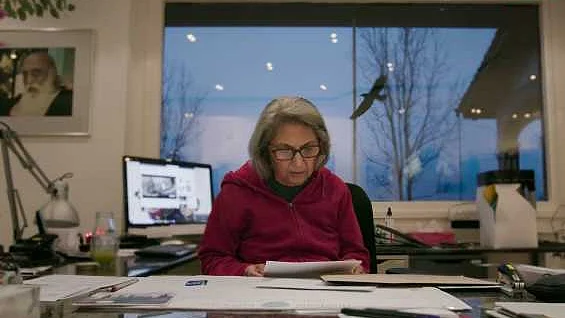“Put yourself in my shoes, and look within. How will you feel?” - Ma Anand Sheela’s question to the viewers watching the latest Netflix documentary, Searching For Sheela, is actually the warped gaze that the hour-long film takes.
Produced by Karan Johar’s Dharmatic Entertainment and co-produced by Shakun Batra, Searching For Sheela is an attempt to narrate the ‘other side’ of the story of the hugely controversial Ma Anand Sheela, secretary of late godman Bhagwan Rajneesh (popularly known as Osho). Instead, what it does is openly glorify a person charged with heinous crimes.
The eye-opening 2018 series Wild Wild Country showed Ma Anand Sheela as some kind of a ‘goddess’, who would go to any lengths to attain what she desires. Described as a power-hungry megalomaniac, the show followed Sheela as she took on state and federal authorities, fled Rajneeshpuram (the problematic utopian city Bhagwan and Sheela were trying to build) and eventually pleaded guilty to charges of murder, wiretapping and assault. She was sentenced to 20 years but got out on parole after 39 months owing to her ‘good behaviour’ in prison.
Searching For Sheela, on the other hand, tries to take an empathetic approach by chronicling the emotional story of a 70-year-old Sheela, who visits India after over 30 years, having spent her ‘exile’ years in Switzerland. We also learn that she runs two facilities in Basel, taking care of the elderly suffering from mental impairments.
The moment Sheela lands in India, socialites and their entitled kids start fawning over her. We see the woman sauntering into posh Delhi parties, wherein guests are queuing up to click selfies with her. “I am such a big fan! We are such big fans!”, they gasp, ready to buy into everything Sheela has to say. The documentary also invests a good amount of time deciding which expensive designer wear Sheela should be clothed in. It’s almost hilarious as to how hard the film tries to brainwash us that Ma Anand Sheela is the ultimate ‘boss lady’, a term that should have been done away with long back.
Throughout the hour-long spectacle, Sheela repeatedly says that she has done nothing wrong, that she hasn’t admitted to all of the charges pressed against her and that she is not someone to live with regrets. Despite being branded a ‘criminal’ by Bhagwan, Sheela does not for once question her devotion to him. The film, in fact, opens with Sheela’s room, the walls of which are adorned with framed photographs of her and Rajneesh.
Time and again Sheela describes how she was enchanted every time she saw Bhagwan, and that’s the same kind of spell that seems to be cast on Karan Johar and a prominent journalist, who seem enamoured by this enigmatic figure while they sit to interview her. While Karan chuckles that Bollywood celebrities’ ‘scandals’ are nothing compared to Sheela’s, the journalist asks by making dramatic expressions how she could contain her anger despite being wronged by Bhagwan.
From Bina Ramani to Raghu Rai, everyone appears strangely sneaky while trying to get Sheela to open up, but the woman is shrewd. Years back, this same Sheela and Rajneesh managed to fool thousands in the US by selling them a lie; this time Sheela is doing the same thing by re-branding her image.
The most cringeworthy moment in Searching for Sheela is when a group of women whisper amongst themselves that they will be hosting a ‘murderer’. It’s passed off as some kind of sick joke. It doesn’t matter how that person has become the talk of the town. A celebrity is a celebrity, no questions asked. When provided with a platform, Ma Anand Sheela can choose to peddle whatever narrative suits her best, but the problem arises when a movie decides to uphold that gaze.
Searching for Sheela is replete with archival footage of a young Sheela addressing the media, her followers and the public. She gives everyone the finger, does not hesitate to mince her words and is unafraid of consequences. Does she still harbour the same thoughts? If she indeed did not commit the crimes she had been accused of what really happened? How did a person, accused of bioterrorism, end up becoming a caregiver?
Sheela expresses her regret that journalists hound her with the same questions, but then what new information are we expected to wait for? Most importantly, why isn’t there a credited director for the docu-film? Wasn’t filmmaker Shakun Batra planning to helm the project? All we are left with in the end of the docu-film are questions.
There’s no need to turn to Netflix to watch a cult figure who hypnotised lakhs with elaborate speeches, giving them hollow promises of an idyllic future and is now looking to become some sort of a pop icon. We are currently living that reality.
(At The Quint, we question everything. Play an active role in shaping our journalism by becoming a member today.)
